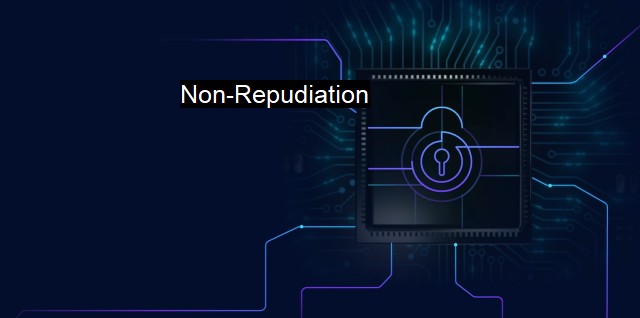What is Non-Repudiation?
Ensuring Accountability in Cybersecurity with Non-Repudiation Techniques and Cryptography
Non-repudiation is a key principle in the world of cybersecurity and plays a crucial role in securing digital interactions, communications, and transactions across the internet. Embracing the understanding of non-repudiation can profoundly enhance the strengths and protections of a cybersecurity structure and its policies, letting stakeholders to securely engage with online platforms, share sensitive data, and perform monetary exchanges effortlessly.Simply defined, non-repudiation encapsulates the assurance that parties involved in online communication or transaction cannot challenge or refute the authenticity of their digital interactions or involvement in a later time. The procedure aims to tie digital actions and initiatives conclusively to the individuals or systems who performed them, providing structured security infrastructure than can attest to who exactly did what and when at any identified point in time.
For instance, if a person sends an email, non-repudiation technology can furnish validating evidence that they indeed sent it, thereby making it impossible for the sender to later deny the performed action. Similarly, in financial transactions, non-repudiation is deployed to confirm the action cannot be denied by the party initiating the transaction.
Broadly speaking, non-repudiation requirements and measures can be extricated into two parts: non-repudiation of origin, which confirms the sender cannot deny having dispatched the message, and non-repudiation of delivery, ascertaining that the recipient cannot deny receiving a message.
Non-repudiation is attained through a combination of technological solutions, with two primary methods being digital signatures and encryption. A digital signature, similar to a physical one, is unique to every individual. Acting essentially as a cryptographic code, it can offer validations about the actor of a particular action, while also providing data integrity checks. By using algorithms, these digital signatures generate unique hash values for each document and sign it identifiedly, making it firmly tied to a particular user or system.
On the other hand, encryption can conceal the data within a document, message, or file by utilizing a unique algorithm to convert the readable data into an unreadable format. In this encrypted state, your data can only be accessed by individuals who possess the rightful decryption key, which could be either a password or a passphrase. This process not only fortifies your data against unauthorized access but also serves in strengthening non-repudiation measures by maintaining the status quo of data in transmitting; thus preventing alterations or manipulations of the original message.
Non-repudiation also has highlights on antivirus point of view in cybersecurity. While an antivirus software checks for malicious threats and successfully guards against them, proving that a specific threat came from a specific source, can offer another layer to data defense strategies. Non-repudiation allows the tracking back of malicious hacking attempts by keeping a concrete digital footprint intact, making it eye-catching for cybersecurity professionals.
Despite having standout importance in online world, there are still challenges surrounding non-repudiation. These challenges arise primarily due to the difficulty in recreating the exact conditions under which a particular action occurred, making it tougher to provide irrefutable evidence. updates in technologic trends are also shaping a new landscape for cybersecurity professionals to keep the protocols updated.
Understanding and utilizing non-repudiation holds the prospect not only to bring additional trust and the assurance of data integrity to business-customer or business-business relationship, but also fortify infrastructure against industry-level threats aligning the cybersecurity framework with advanced and secured terrain. Adopting these methods and tools to support the non-repudiation, can greatly improve the mutual trust via electronic communication and transactions.

Non-Repudiation FAQs
What is non-repudiation in cybersecurity?
Non-repudiation is the ability to ensure that a party cannot deny the authenticity or integrity of a message or transaction that they have sent or received. It is an essential aspect of cybersecurity as it helps to prevent fraud and disputes.How can non-repudiation be achieved in antivirus software?
Non-repudiation can be achieved in antivirus software through the use of digital signatures, time-stamping, and secure storage of logs and data. These techniques can help to ensure that antivirus scans and updates are authentic and have not been tampered with.Why is non-repudiation important for businesses?
Non-repudiation is important for businesses as it helps to establish trust and accountability in transactions and communications. It can also help to prevent fraud and disputes, which can be costly and damaging to a company's reputation.What are some common challenges to achieving non-repudiation in cybersecurity?
Some common challenges to achieving non-repudiation in cybersecurity include the use of weak encryption, inadequate logging and auditing, and the use of untrusted third-party software. Additionally, human error can also be a factor, such as when users share passwords or fail to properly authenticate themselves.Related Topics
Digital signatures Public Key Infrastructure (PKI) Secure Sockets Layer (SSL) Transport Layer Security (TLS) Two-factor authentication
| | A | | | B | | | C | | | D | | | E | | | F | | | G | | | H | | | I | | | J | | | K | | | L | | | M | |
| | N | | | O | | | P | | | Q | | | R | | | S | | | T | | | U | | | V | | | W | | | X | | | Y | | | Z | |
| | 1 | | | 2 | | | 3 | | | 4 | | | 7 | | | 8 | | |||||||